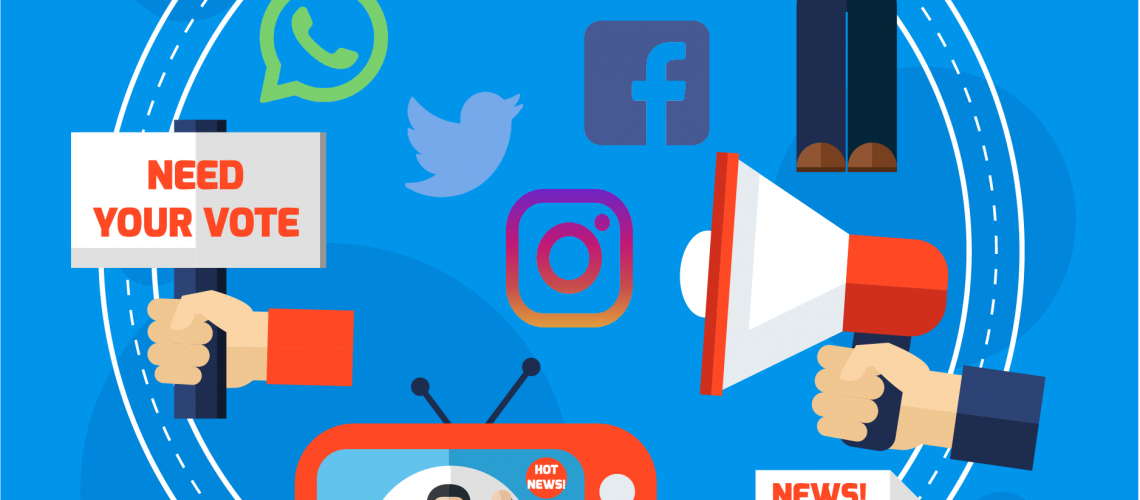Social Media and its Impact on Elections :
- India is a democratic country where election campaigning is an integral part of it and from time to time the Political Parties have been using different tools for their campaigning. It’s very different from the way politicians used to communicate a decade ago, Social media has changed the political game, allowing incumbents and newcomers alike to speak directly to voters on everything from their own vs opponents parties’ policies. Almost all Indian Political leaders have taken up social media importantly Facebook and Twitter to express themselves without the filtering of traditional media.
- Current age new political aspirants get extended support from using social media platforms, which cost as less than 1% of the main media cost and are easily tapped by anyone with just a smartphone having an internet connection. Based on the elections happening around the world it’s a known fact that social media can help level the playing field in politics, where money and access to formal communication channels pose huge barriers to newcomers in politics.
- Political campaigns are not just confined to posters and banners to reach their voters. Social Media campaigns are is full of info-commercials, advertisements, blog posts, and lakhs of tweets, Instagram posts, Facebook posts. Politicians are now able to convey their message through endless info-commercials and gauge their communication by viewing direct responses to their actions on social platforms.
- Political Fake News stories or hoaxes are created on social media to deliberately misinform or disinformation and deceive the voter. Usually, these stories are created to either influence voter’s views, push a political agenda, or cause confusion or manipulate perceptions. What would happen to our communities, our business, our government if we can’t trust what we read, hear, or see?
- As political campaigns are expensive and the need to reach out to constituencies is becoming more imperative, social media will undoubtedly play a more important role in influencing electoral results.
Pros of Social Media in Election Campaigning :
- It is easy to get the details on social media about their events, schedules, or even an election agenda
- Representatives can directly interact live with voters without the need of any middle man.
- Political representatives can engage and dialogue through social media with the voters.
- Minute by minute information is available on social media
Cons of Social Media in Election Campaigning :
- Connecting local masses and reaching out to the individual voters who are not on the Internet is difficult.
- Politicians use this to make more noise and are sometimes a way to encouraging polarization.
- It is a threat multiplier and it can increase the overall suspicion, outrage, hatred, and violence because of the Misinformation and Disinformation.
- Political minorities are using social media to create a political gridlock
Media Certification & Monitoring Committee in India :
- Clearance of political advertisement by a committee before being telecast on television channels and cable networks by any registered political party or by any group or organization/association or by any contesting candidate during elections. MCMC’s three major functions are (1) Pre-certification of Political advertisements on Electronic Media including Social Media. (2) Monitoring and action on Paid News cases. (3) Monitoring media violation cases during the election process.
- Election Commission has developed a set of ‘Voluntary Code of Ethics’ for the General Elections prior to Lok Sabha 2019 elections. Voluntary Code of Ethics’ has been developed to ensure free, fair & ethical use of social media platforms and to maintain the integrity of the electoral process.
- At a high-level Media Certification & Monitoring Committee approach looks good, but in practicality, there are plenty of open statements in the approach, as we seeing every day political parties speak defamatory about opponents and sometimes issuing provocation statement with an intent to incite violence.
- The nonexistence of a regulating law of Social Media along with the non-application of Section 126 and other Sections of the Representation of the Peoples Act 1951 further results in abuse and misuse of social media.
Best practices for political campaigns :
- Fact check by social media influencers prior to publishing
- Engaging voters with live videos
- Young voters mustn’t be ignored
- Put your fundraising/expense efforts open to voters
- Learn how to manage online negative comments
- Request for feedback or opinions online
- Focus more on shares than likes
- Post positive, nonpartisan posts as much as possible
- Have a schedule for social media posting with one point a day
Conclusion :
- Social media platforms, political parties, civil societies, and the election commission should put more effort into how these social media platforms are been used by the politicians during elections and frame a comprehensive guideline that is in benefit of the voter.



